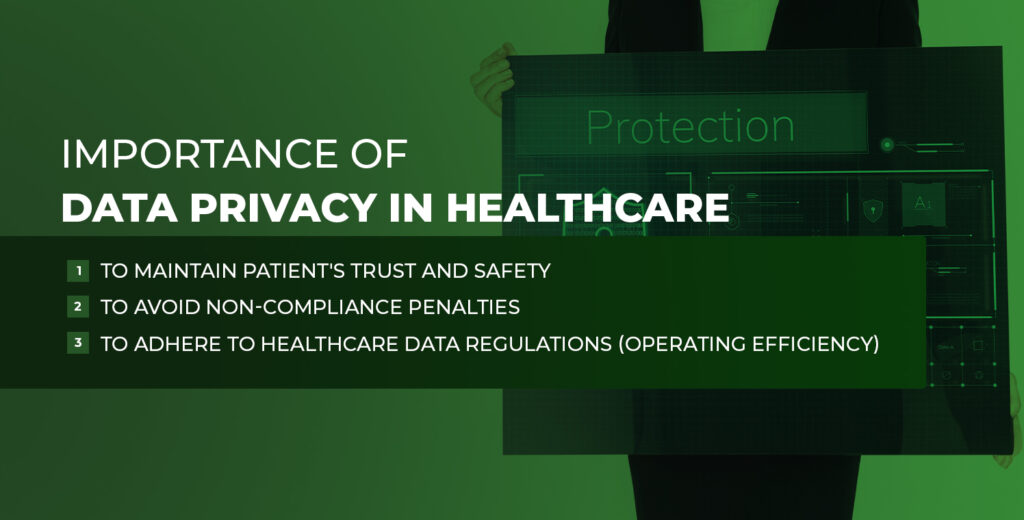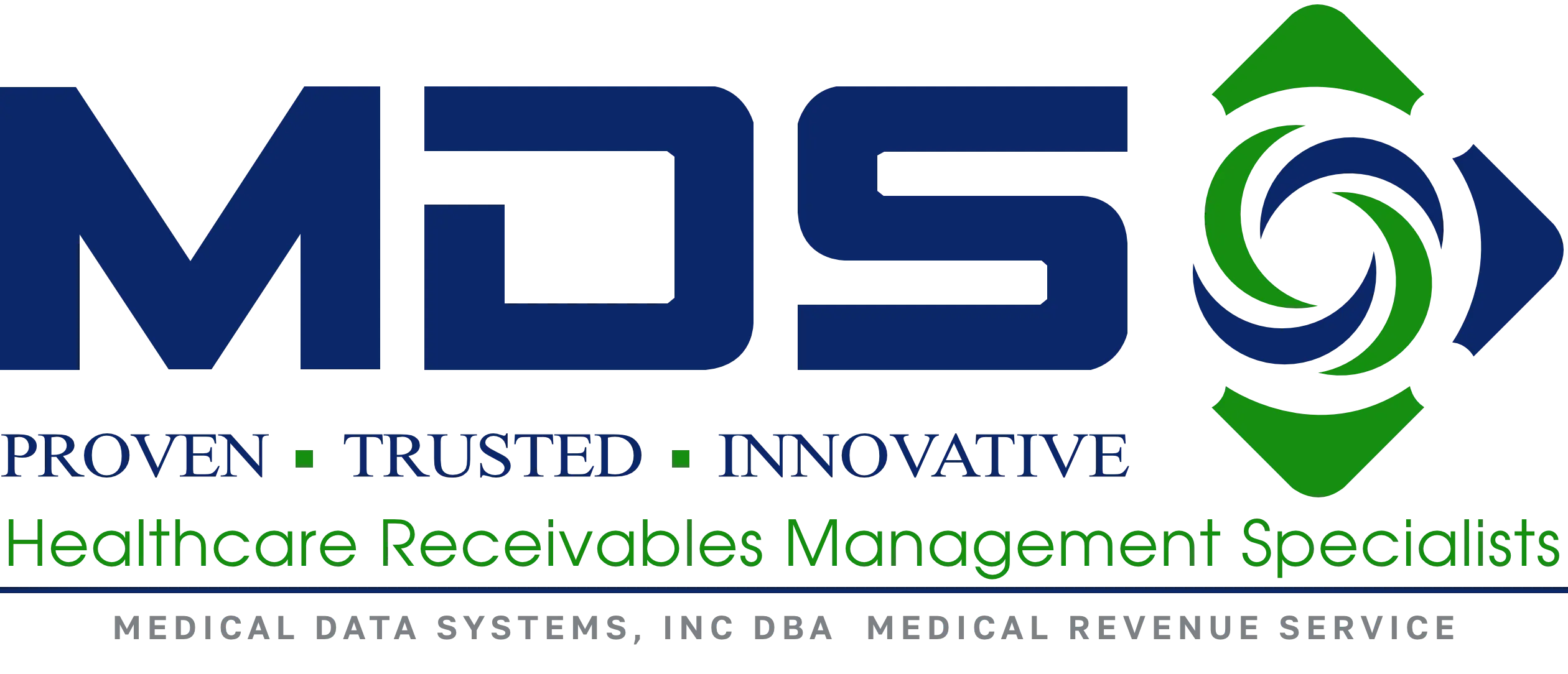With the power of digital evolution, organizations are becoming more data-driven. However, protection of the obtThe Role of Data Security and Privacy in Healthcare Analytics. With the power of digital evolution, organizations are becoming more data-driven. However, data protection in healthcare is not an easy feat. For instance, when you book a dental appointment, you also give healthcare organizations data regarding your dental concerns, weight, diet, and current medication. Now, suppose there’s a breach in healthcare data security due to improper measures—then who will suffer? Both you and the organization’s reputation! Here is where data privacy in healthcare is essential.
Protected health information has become a mandatory requirement for the healthcare sector. As patient-centric care takes precedence, organizations have started enforcing data protection provisions to protect confidential information and prevent unauthorized access. Considering the same, strict regulatory guidelines are set by HIPAA and GDPR to maintain continued compliance with sensitive health information.
According to Statista, the annual number of data breaches in the U.S. healthcare sector increased from 16 cases in 2005 to 340 incidents in 2022. Again, a report by HIPAA Journal stated around 373,788 healthcare records were breached daily in 2023.
So, let’s understand how the technical shift has catalyzed the healthcare sector, emphasizing the protection of confidential information.
What does Healthcare Data Privacy Mean?
In this age, digital data is pervasive everywhere, making privacy a complex issue. Defining privacy for specific domains is challenging, as no one-size-fits-all solution exists. Each domain has unique requirements and contexts, leading to varied privacy challenges.
The growing concerns about the introduction of encryption protocols in healthcare organizations have created a buzz among providers. Each medical organization has legal and moral obligations to protect PHI from potential cybersecurity threats. Data privacy and security in healthcare work in tandem to protect patient information and secure healthcare systems against unwanted digital intrusions.
Hence, data privacy in healthcare entails the technologies and policies used to manage, handle, store, and share data with third-party vendors with proper compliance in place. The comprehensive approach of safeguarding the data records reduces the risk of data breaches without compromising patient care.
What does Data Privacy for Healthcare Data Include?
Data privacy in healthcare has noticed a significant shift in the last few years with the rise in global development. Many organizations have implemented standardized rules to improve data protection in healthcare and ensure patient data privacy. These efforts have highlighted proactive ways to maintain transparency while building better patient-provider relations.
Sensitive data includes personal information related to the patient, including their names, addresses, SSN numbers, birth details, health issues, and more. Disclosure of these details can have several consequences for healthcare actors. For the same, the heterogeneous requirement for state and federal privacy laws is being simultaneously applied in the healthcare space.
Generally, data privacy is comprised of a few elements, such as:
- Healthcare data compliance: This applies to rules related to data protection. Using these, an individual can retain control over their data without allowing it to get misplaced.
- Data Privacy Procedures: Data privacy assists in the collection, processing, handling, and sharing of personal data.
- Data Privacy Assets: Using decryption keys like AES or TLS to secure electronic protected health information (ePHI).
- Role-based access controls: Access control measures like multi-factor authentication, biometric authentication, and strict user permissions limit data access.
Therefore, by extending security services, organizations can protect such healthcare information and prevent all persisting IoT risks, such as ransomware attacks, interoperability vulnerabilities, and unmanaged IoT complexities.
Importance of Data Privacy in Healthcare

Practically, every sector must focus on data protection. Data privacy and security in healthcare was enacted in the US to establish prominent HIPAA-compliant regulations. Since 1996, the implementation of this law has been mandated for all organizations dealing with PHI.
With digitization, an anticipation is noticed in healthcare providers to invest in cybersecurity measures. This portrays the resilience, accessibility, integrity, and confidentiality of patient data.
To Maintain Patient’s Trust and Safety
Today, more than 30% of the global data volume is generated from the healthcare industry. This number is expected to grow further to 36% in 2025, as per the data estimate conducted by CAGR.
Data security is imperative to establish a foundation of trust in a healthcare setting. It comes under the duty of a healthcare organization to prioritize sensitive information so that patients can entrust their lives to an entire healthcare ecosystem. Any data breach, in this case, can damage the patient-provider relationship, putting the patient’s safety at risk.
Hence, patient trust is vital for all healthcare organizations, from private clinics to big multi-speciality hospitals. Without attaining patients’ trust, it’s difficult for any medical organization to operate and grow properly. Following this very reason, medical organizations are advised to follow strong HIPAA standards, fostering patient data privacy within their organization.
To Avoid Non-Compliance Penalties
Beyond potential breaches, non-compliance penalties can severely impact healthcare organizations. Failure to meet GDPR and HIPAA legal obligations can result in hefty fines and penalties.
In certain cases, any misconduct can lead to the permanent closure of the organization. Hence, organizations should scrutinize their operations thoroughly and develop a foolproof strategy to maintain data privacy. There are technically 4 levels of non-compliance penalties for medical organizations:
a.) Tier 1- These violations occur without any direct fault. For example, a clinic may encounter a healthcare data security violation despite following the rules properly, such as when a software bug inadvertently exposes patient data.
b.) Tier 2- When a medical entity was aware of a potential violation but couldn’t prevent it despite taking action. For example, an employee unknowingly falls for a sophisticated phishing attack despite ongoing security training.
c.) Tier 3- Despite understanding the importance of privacy in healthcare, healthcare organizations intentionally violate data protection laws. For example, a few organizations fail to encrypt patient data in spite of the known risks.
d.) Tier 4- The violations are pretty common when organizations neglect the data privacy in healthcare rules and don’t attempt to correct them even after being made aware of the repercussions. For example, intentionally selling patient data to third parties without consent and refusing to rectify the breach.
Though not technically criminal, successive violations like the above can expose healthcare facilities to increased regulatory issues, higher fines, and loss of patient trust.
To Adhere to Healthcare Data Regulations (Operating Efficiency)
The healthcare sector is one of the prime targets for cybercriminals. In such a situation, compliance with the data privacy standards mandated by reputed healthcare bodies is essential to safeguard patient information amidst heightened risks of data breaches associated with widespread EHR usage. Check out the measures laid down by reputed healthcare bodies.
General Data Protection Regulation (GDPR)
General Data Protection Regulation (GDPR) The GDPR applies to the European Union States. This law imposes strict data protection standards to protect sensitive health information. The regulation explicitly checks all healthcare sectors to understand how data is collected, garnered, maintained, and protected from unauthorized access. Non-compliance with this law can result in reputational damage and significant financial penalties.
Health Information Technology for Economic and Clinical Health Act (HITECH)
HITECH was signed in 2009 to encourage the adoption of EHRs by healthcare organizations. This law aims for stronger healthcare data security and privacy provisions, making it harder for medical records to get blatantly stolen. As this law has undergone multiple amendments, any organization not abiding by it can be fined heavily.
Health Insurance Portability and Accountability Act (HIPAA)
The United States initiated the first measure to maintain patient data protection through the HIPAA Act. This law was passed in 1996 with both a ‘privacy rule’ and ‘security rule’ to protect identifiable health information while preventing it from getting stolen without consent. The primary aim of this law is to promote high-quality health care and ensure the well-being of the patients.
Other Relevant Laws and Regulations
In the interests of consistency, healthcare providers have designed various policies across jurisdictions. A few examples include the California Consumer Privacy Act (CCPA), the Personal Information Protection and Electronic Documents Act (PIPEDA), the Data Protection Act 2018 (DPA), and Telehealth Privacy laws to promote data protection in healthcare.
Challenges of Data Privacy in Healthcare
There are always new challenges to data privacy you need to think about. As the proverb goes, ‘Precaution is better than cure,’ similarly, proactive measures should be taken to mitigate these challenges, protecting personalized data. Take a look at the common challenges healthcare professionals face today.
Insider Threats and Unauthorized Access
Even with strong healthcare data security measures, these threats cannot be prevented. This is because such threats arise internally, posing significant challenges to patient data management. Employees and stakeholders with legitimate access can pose insider threats by exposing sensitive information. For instance, a trusted stakeholder accidentally shares patient records with unauthorized individuals while collaborating on a project, compromising data confidentiality despite strict access controls.
Rising Complexity of the Healthcare IT Environment
The constant evolution of cyber threats creates more opportunities for unauthorized data protection breaches of patient information. Additionally, the widespread adoption of electronic health records has increased system complexity, challenging the transmission and storage processes. For example, inadequate encryption protocols in interconnected systems can leave patient data vulnerable to interception during transmission.
Emerging Threats Due to Evolving Technologies
As healthcare organizations adopt new methods to infiltrate systems such as artificial intelligence (AI), Internet of Things (IoT), and cloud computing, interoperability challenges are on the rise. Integrating systems has failed to ensure consistent data security policies across platforms. For instance, integrating softwares in remote medical devices may inadvertently expose patient data due to inconsistent security measures across different devices and platforms.
To address all these challenges, healthcare providers must work with security experts and conduct regular risk assessments to identify and eliminate any risks associated with the healthcare data security of patient information.
Conclusion
The healthcare industry is undergoing a period of rapid change. New technologies and external factors are creating exciting possibilities and introducing fresh security and privacy challenges. Data privacy in healthcare remains a persistent concern, requiring protection against cybercriminals and unauthorized access. If you don’t want to compromise healthcare data security, then Medical Data Systems is the best place to find a comprehensive solution. As a leading Medical Debt Collection Agency, this company offers a robust solution to address all data protection in healthcare challenges by enabling controlled access to resources and ensuring compliance with regulations. Learn more about securing your resources by getting in touch with us today.
Privacy and security in healthcare will continue to evolve as technology and regulatory requirements change. Organizations that proactively invest in safeguarding sensitive data not only protect themselves legally and financially but also build lasting trust with their patients. about securing your resources by getting in touch with us today.
